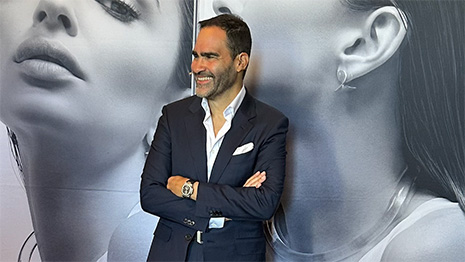By Daniel Langer
We are at a pivotal moment, and for many luxury brands it is the perfect storm: Growth rates are slowing down and getting more in line with historic numbers, the transition to Gen Z is a headache for many brands, the significant price increases many brands implemented over the last 24 months are causing client backlash, and the rate of change is increasing dramatically and it will be further accelerated through the emergence of artificial intelligence.
AI replaced the metaverse in creating the next FOMO. There is practically no brand that is not contemplating the use of AI and millions of dollars are spent, many of them with questionable results.
Similar to the recent over-hype of the metaverse, my impression is that many brands are focusing on the noise and overreacting instead of taking a strategic approach.
Meta missteps
Currently, we find ourselves in the era that eventually will be known as the great commoditization of AI, a phase marked by a rush in adapting generative AI at scale, driven by the enormous computing power that already exists.
Technologies such as generative AI promise innovation, but often deliver little more than a superficial enhancement of existing tools. Importantly, they are large language models, and depending on what they are trained for, they can be of little use when used outside of the trained context.
The predominant focus for many brands has shifted towards crafting a better chatbot or a marginally more personalized shopping experience, leading to a landscape where differentiation becomes increasingly challenging.
Remember, luxury is the opposite of commoditization, and yet brands race to commoditize the client experience with tools that everyone is going to use.
This scenario mirrors the enthusiasm and subsequent disillusionment with metaverse initiatives in 2021 and 2022, where organizations poured millions into virtual ventures that, for the most part, failed to deliver tangible value.
The critical misstep here is the luxury sector's focus on AI-enhanced solutions over AI-enabled transformations. The distinction between these approaches is not merely semantic, but foundational.
AI-enhanced solutions refer to the incremental improvements in user interface and experience, leveraging AI to refine what already exists. In contrast, AI-enabled solutions are groundbreaking, leveraging the unique capabilities of AI to create entirely new value propositions, business models and market opportunities that were previously inconceivable.
In the era of "more of the same," it's worth asking: What is the return on investment (ROI) of these AI activities? Are luxury brands truly innovating by deploying AI-powered solutions, or are they caught in a cycle of incremental improvements that offer diminishing returns?
The luxury industry, known for its exclusivity and innovation, risks falling into a trap of uniformity, where brands struggle to differentiate themselves in a market flooded with similar AI-enhanced experiences.
Looking back at the investment in metaverse initiatives, the question of value creation becomes even more pertinent. Much like the initial hype surrounding the metaverse, the current fascination with AI runs the risk of leading to substantial investments in technology that fails to deliver on its promise of transformative change.
AI advantages
The key lesson here is not to shun technology, but to approach it with a strategic mindset focused on leveraging AI to enable new forms of value creation rather than merely enhancing existing processes.
So what constitutes AI-enabled solutions that could become game changers for the luxury industry?
First and foremost, these solutions must go beyond the conventional areas of customer service and product personalization. Imagine AI that can predict emerging fashion trends by analyzing vast datasets of cultural and social media cues, enabling brands to be first-movers in capturing the zeitgeist.
Another example is to make sense of the social sentiment to measure the brand story that the public perceives in real time. The AI-powered technologies to do so have existed for more than five years, but few brands utilize them strategically and even fewer to monitor the brand performance in real-time.
In one recent project for a major luxury fashion house, we were able to dissect the reason for their store traffic decline in a flagship location in the more powerful social media campaigns of their local competitors. Without technologies like these, the root cause could never have been identified.
Practically no luxury executive I have ever asked was able to tell me the development of the customer sentiment of their brand over the last two to four weeks, which means most brands are managed without instruments to be able to anticipate competitive moves and client sentiment changes in real time.
Or, consider AI-driven supply chains that not only optimize efficiency, but also adapt in real time to shifts in consumer demand or global disruptions, ensuring a level of agility and resilience that becomes a competitive advantage.
Moreover, the integration of AI in creating sustainable luxury, from optimizing material use to reducing waste through predictive analytics, could redefine the industry's value proposition in an era increasingly defined by environmental consciousness.
These are not mere enhancements, but transformative capabilities that can set brands apart in a crowded marketplace.
The luxury industry is experiencing the most massive change, where the choice between AI-enhanced and AI-enabled strategies will define the future landscape of luxury. The pursuit of genuine innovation requires a bold reimagining of what AI can accomplish, moving beyond the commoditization of technology to embrace the possibilities of a truly AI-enabled future.
Are you ready?
{"ct":"7WQfIa4OvCNEX0TpAJw765ZGNkH52Ngneao6WPc1n7d0OFCEzalAHq+\/WKIHcOsQppyYWPnJHdRWQCkKIQXI2aRaObExR6mJMW9FYCM\/ZNpWnBG7TOpA4ysq\/V8CXNwCmDXFZf\/Anc0W\/Ckgc0ykOlBW7zrokKlcz2SY61aEHQGcaEEPRr\/RdYq5yJW6kkFa7grdSuiMUwmpf4jLNh7zBHe3i2ZX3MkxHL8l7s9eIdntX0bL\/gwi+E8pzJ7oD5q0K\/WidRmlASx2cVYWxCe2bX7AMWrN6tTiEPS44XxL3snuNLK+4c7A+0Zq8kIJmCx2BoTq6LbEHT4q01wu5NBvICcu+K6DB987aYt\/CxKiQIMsKfUdPrwG078OC+1WS0rJkgwOfjgEc4HZ56hObjL3TZhNf79F25DN5oxt0+j9F093HffWlIwZfxsBnjDc+AbvO0tvQaRk7YSGEeo\/\/FrkYtfR9f5p78E96fKdkNgqbyZE45Rasu3NRRlWRaKmbxYmxcRivwXTXnLsjJ6IN2R3zDKHxNoU8jeBA27RXIZCkD+H9DM4zONLm6lmMld\/221I\/XQ8TkEFC65Kic7qPU99BrZ2BBXTiHelfQn8SxtbSpQyCijnKJ6qKhwiLUNS0SDMRk60XFuQDLw7At1aZIdNMa+2lQt3ffyAr9K\/VZsUaZTMq\/cs8xvMPl+J9vnTzg9yPTQrG3WaNPN+C4m8fcVm0A6TdZkNMoTLUdD3YeKLAp20lVUXUcgO09iH8QoE1TUlGAA+fYkwtvrZjO7D+nPEsgY\/y7gzPwdb8JKvHuRucumJaUWHIJD7HFkGreJcyjqe6i3drIDN9Pwa0Bug7hHFq6K0buGMMzlWnAv7NxcTPhG\/yfpmcZn\/nOgRzepAOEnwJyfL+v1bFyOgQrD\/s9dO3ajGkXbSgpyOb8gCZl820bZQIu3YFLmQNLRgaO6ngre0JNKCotYnopO2ML7CJQ0QqO8u8ZnSAlAVns191UOWF25OUpml4\/w7fjKcLecqODOfiDhHycBR22kvh7PmkeVPSpiI3M+jU0LQmOMxucbD5XkJ0gHHVIuoXFgdBVjZsqvS28m7HXO5g85E\/uHkGXGOscpq68d0XjruBjRD3\/4mpZAKR4QuHZdd9IMWheZkwzHkjfOCpf+0WJbpohSmf3tWU4To9BxMeruKwqvUR8eElOHK6pBa4mSB2lbOp4O7qhUQRerjyHVPruAvQ3toDzkvZ\/KiUJCbw\/cUgiOW8aBfnEPW5C3605N6RisfbnAJsE8cOJiIuzztlOxJgUof3lJJ\/ffdV+Xw9OVNTVvqAB58QWyVkyB5IwBmGS3HpBLXoiu4xDHDKuuuzBWM\/hiXOKAdDG59abNsMu4saWm6+w84VcK3LAV6Y6SKTBkKmU450rhKR7QptiMV+CY13bLm8iiHtlRpnuhODYT2mrAmkl8ajoxBs0zpkBBLyytb1FuASePhWS3RbqYfn6NftLa8Xt13ip5feBT\/cVP+cdCk7jdpCbgRw67w7A\/bDeymtil5OD5kW8k7uHBlQrhBAZQgaKtI9vwYhNlwaBJJ9HD+V+Qhhjtf14G+3ipyoxmhFptmtR8ttb75zZrgFdWqkV10tSteF3GM55ijEVoM6LCHIL6mEJ1i3m+Dcc3Yemum5JPH\/GF43FiGujL49I0RMbbaM12PG73k5drgD+xqXN0YlGJaHFJ1pK0ym77qwhtb2sRZF4A+zgwlWzCKWXWOsiLxbMKs1F5lP9agN0BWa2Wkwx2HSsuyHXoUUB2ySGTMxNW6WMFnjZ1TUaHJCJv2wa6DAUT4RdHhpJAEYOq4Zy2BGC6EFh4AH7V62K8UsG7neccmKbrHEPnSerUN1Ty9RVpGCXNcxT6KWFecUfgMjNTXwHZFw41Zz1cFFb2sg1X7QWGYRBx+rKvoABoTfye\/wGkziirzcQtXjEej76g+Q3TxKxQnQJXWqSOQxiQmnFe3Jv2+W\/9dkmArVuQ+4XlVLlIQi2QyPP116OjCjGOiPxIUpRT0f\/RDm1vGywwrVXDkmpLmkRa60A6iTEfs0E3nFMsOoVciaNqYRW6a35cPAgg1byleRJUM0TJCW2x0MX4nEOJj9DRcbePbyn+MYjsb7UxsEyM+9SIVTan+MjtSXmjyfE\/51Uh\/YPzRpAzToqUTat68chFAACYY4WQ7lbxn+DtpZkAzXGq3mvera9q4kdVTQciXO1Akfky+FIE4CXTS85UM7WfLrD9e+tEtSIObJP7JgJdCDeH9rasxQ0evkFSwjSD6Gyj\/HdqwjFJpkvjm7z+NqskJV57WO4XgNratwgcymYrC3Ro9EHa1Pf7Y5yynqJHuqZdXR9YRbIhQM4N3FnILKy8R+k9O3cvJWY+iTv\/S2NA+eCbW8wK6Y0\/KlgkTi3tn67PFhhElK1WYokuOh6AcxpGuVaPjl2jo6gc7OxC4AIz8EEotog4UsSyZY6sqhJOr\/Mn4m4NUbvX+6fooKJmJ6dJFLaDjWsYSlJMjUDkc6JXz5NIsshG8e\/f30LpX+jEfLV9nWhsXaLp3zOXYTz5uXFDibQE61LHL71CXmHD5tcaq0fbH6F1yVeUeiEK2GMcMuRtU19jWyknUKWHdQfsK5FQp7liQdDG5AfM4VSmBMvih21\/2WbTsWxf6lpgTwQ5gufZzTPX\/cmPvvViljk0\/oxK1gsVx9d8n8LDu6F2HGU3Zs4Oj66k14TKRMVO5sywiVtTW0YIFiOM6kLWlR1l2PyQkySbMSJRd3vik7FYRLgCUeXsId8GYLAyjlxQ2Xuno7c0f1Fd4qz1m6QhWTQz0LeouluHfVfjzPDGxtZoBMJahMu+40RJn0Spq9M9s5o\/2a5soh3N\/lYfufQTyOnHmyU2Udm05Gkrj9h2AwS6qb1KPuBz9TmwB0kBNQDBNSSi49hjwJi6CqpbmPMjyjmlDAVOExRyMM6jxl98ubsYPD1mrLDifGb+VIGOmMNW9lnR7wig2GGh1rsh++0VdLY5L9taEhhh5xkAjcdLuOHA+kMg+YATQlp\/IFXWRCz+mmblUyGUe2P6XSECHDOQ3B23Y9t8NDPmHbk7VKFaOpp+AKN1+xxYwOcRsTUz6PSVnlX4YivcOH8syojvL0fHTKRF9z0Gy53rI63OMXflq6414\/y4pEuDHcYcZPCa2u0i4IcnOueMZB\/7cf7WMqNE3d3SFjKhWzKyh0kM6hxYZJQHq67AUKgo801ATsWSfpRBZxILpwuOwtc7O3VzBOAqnGqPWcgYbn0P90u0ej\/y8IYW9GFEy+X11P4RonnrNkI6gBgcpF6Ez7U3tNGTbCylPwMpou4h8Lv5Hi5xrcfYDArLSwoEqh4j2xWg3uf+aExNOTU3weGQq3M4zvJZI\/6wnfD3xB3lg+9JIDG0JPiRwIsqZHadtJ+T+CmakrU1q0ucyuQGX61jJLhCvSYY0V2Xj7tGDl8f6eecKX0LqoJHI\/d82KARDO88Did5zqLsbynJHl\/JRS0dobLksPwGP39kZviWxkI4dRKXpDy23vNjCQ9U2\/\/TF+wt2E8qbLFQmpap+FXuoPPeI9CHFFnyX1FJN3fWwK7eaQrigc8jprI\/0Y\/M7xH9FVCZ47qdEeaJanImcNOaGIZG4OxDdt\/daS1+NkmUo7XQIZx4QxJNIEK6AqCARxXzqsFkMpKwDQkcoMyodCme\/APhg8HfixPqw7VTbZmaYNvgQGapeDVfvH8YSRf4ZcjcAqqkZv+h38OtSlPjjoHyY4ABHDToLBBEO2QrIwpaLjPL6\/XHCFU1PrgUSZmMUTrsqSupIlOIOIGiPTpilK6JIoJOrtCT2K8xzNpPwajPtSQQeftlXrXeeNAozIFvSeOIUGb2QYznkkkSK\/Map7GwKsNH8TF0Y6mpJrNsT676ui7kFn+hed4RTfLt3lgIcxapC97kjYlpazbY+frjs24Kln8JgvnEMLybjWLWLlYnSytH17L0sXnJ3xUM8Djutpl90Lu8LMVw0aHdf5UT1pvI42V\/t0VUxuartcZiRy37x2bbxFcuDunbhhnIv95Nj8fPHvpGb4FiPViq0QV5W38ahh3ABf1aAWhLipFUDAiBxGtbCO9\/CLJDGuZ4++MaFPEH81GCN+Fod9\/nXRKyP6pIQI9+7D8QT1z3WUyh\/sv7Ds6Ij1aDkDYMAoQkmGGgws7+AZc86Phxa0wy78rSnnagUo0Dn7F5VEEbtO72n8GEL7TschsoZtYbCU98ObxNPuqvOuHbOaN\/vnEmD7yYo+26+jaYI1ed4koq39zw8vB6law\/pOgnvUbHbobkHNJeYl6GLZ87MciTQLTY0eo7oydeLqPS+hkdI9gXLzpxcdlKetAWoJktLvc8p+3ZF5PPNpb4Td64GWB\/5p55kl5fuvVJU\/YUJwMknfKM9tXS3g\/hiDPQweXHhwU4jVfXWLiibU\/0wYWXybQPot90LE64uka6UaB+wlhLqecNHX1GDjd4MEFjUFEzOu4SzIW4GbRUMibwrEw6yOESKDuRCPY\/z8\/8znXdofLpeATXDSggwUg+jkcnScp+bn0ztTNQ\/Lnd5LNx0jGs8Vz7FdAljgLlqyI0gs6VQ9kxngHhemoB2cxiG+wy2KLvxxneS1Ika9SRSisqUUz\/ufbksl\/h26FRkBZ79F8Kn8fKu2PVu\/m6HGSeDCdkkyywvLAtBjPon+TRX\/Q6ve2c4SUiWeczoXWfiGI+ToFqb\/oKHKGgfKwdUC1dNh0ZonQNxIwdZPspfN3uyFJH4ov3bsT7zI1Jkzai5j2angJFgVLsHKx47Jq2jw3doWxtN12K7pNQkrcHbJ9zpW73kX1lc9523izIvUUofMG4Fe12q\/RBK\/cODC+gwYSQBp3883QYPSz0rjjMRn6aygvuJ7pUi660a+wyx5fJSvYWboHdEuEkFCaMSTFIDnb9b3XP9Fb4FUoEMq5xquKpVpWjRzNIXoC2YwxQBc7hbx+txdSCt\/ELNQBedinpPdOGvMn0Jj\/RkZDTBtNcYDrF1\/8DwTZocFVnZ0kDt5JkYUwQeaG5737CrBeNuyvDx+dSJo42dIQWzvA2wSATpwrdFi8elCusboNyMTZreiP7vPKietXBBI9zGaFjCesDOb8Tn+yiFmsPjGjs1LqvixCnITI8Tw0NOyAPC7+cv5F5fwB1aRXx0PUKnzwgn5xZkUDzHLj8O7iFP29gFRNaxvVKCl+X9oHtVD3p0UYjlq\/Sd+adqf9WjIl8sC9pRlzuIo2XkgqnAG6nAxO27uJvMlP1wr1teD62eHS9yCA6HqRA4C8z+2nPbL4gowHarc72CYsazdGwfnW9EtUaVWXEq\/0cGWIlTYr2m\/Tgwa5fiuSYwBDtxmqag3Sp8JCw8yfFTePTMhe8PdE+ymq5ugObzQ7PduJtAnfIn8DE+ELgmRaB8QsuTPxf44T6L7nnd61xz\/xSeiXUIddJdIrMqskNWkFP2PtLJ0\/ZrCk7LzEZMrZWDm06RH6JXPuWPavlzBHQkff280s8NZsDCxv8SNJgmn9cPkxB1BKPyf+iE3\/chd1CFOS\/Iqdk0N1k7cOU+jghLfNvBJBDoKRA5XTwq\/mLGUFbfrpRyrAON1SI4xNUSjwLA4civDzh2SMYnhIejol2fje0a5IiPDP3F3i3yi7rsA7oEyIbIVcvoEXnQl0JDpax4v9DFN3KhqwOEYb3kvsI\/nHlu08h3LHyvvwnXAej3BUg6biXo9U\/PyMJ+HgPd6lIuSQVKa5QaXpTZc4lwPMlfMay3CjtTxjeCe1zAlheCYCmNvHWKw8rdHp9Nio9xlorjHccNCPTx+3v1JL\/+JOHijYjE4kYWNRhOnp8axYDihT4+3b3q6OfWxS7vu0Yv+yjRizTKNEGJZYwp2AenqG\/j+aoNQF71\/0HMqb4kPxOQu7WcphrvACiylE\/aYwsfqI4Vy0HV7DEx+NkB0QHwysvumZ7in76DTeq6TvoUnn4zCc7BY7EOP6isAB9AHL5eooznY5\/JXEy7ObzlwkbPUek7D1GS6OIR8OCsHA+0N8DdulXG7GmOXg858iWk12Uldb72EZStjKCsL2cuBU\/P91uzWdagyDS7gZzH6xq0beAGmC551iWiWEaS+sFEUSKa\/NXUxNXNzMxHVpCWn88eaDpMC0s5D0Wgq6HaYYLejvMtNW5YEIq4a2m+Qjte8WJa0GjXzbchz8+sYg9pslXjF9SOmMaQLBd86MhNECskelpPw3UFrK\/W2yRQMYGnh\/kbPF+lBdfcUGgYdIjPoGTQK8Av3+VaSK88aCE1Tzs80P\/xftAiZWX8xyuNtjqlxrRUMP2m7MdruTtaqJSQmL1q1C8gcfI8mLzEWn+M373aCCwJsESyTlRh3ZIB3XJ+haLZLNg\/isvsJHuzbVgojTVrqS6+I\/dS8w2usF5wk4Xki+1YTqiO3aAoqBhs57+NZHAPdSTUGL+op\/jT9fsz\/aGnffKTovOuqdI2SWf5IHhTlCREWkJUEAmPV+unudMvjQRQDuIrCcB228bz44qVGjekMVLwgKr0bx9SyaCr3U4A0NhM5+o5OirlApXsByW4XGtjJXJixktHNSsVLNNzWfdh0AtEyAgP+UOv0wcAK7ubbrlVWJglTPiUqHmbJjvNJUNpWAdM\/IW\/ABe+s\/ZgjE5KyKJgsTEG4pilEaqj\/LHdDYevSashiLl2BeAUxs6fc8AcUbId8xjI6pEhXEAH0xCy6B3OJEmiYWZpa83Jk5KhMj1yElZFtg1a4YqGeIuAVuoGNDOF1YxFx9AhI4fovZKEgayhaR9gklRWsg6RF9uScuW6gY6KMWeZE6pJM42LcwFxriWFG+Ay2DU88o2PPpaGgC9ulnxykBiT9RLiiTERxc1EHdXbhFdBf2uDv5qMS0Q6qIr9ydu1abQPwHMJm7wyGTa+62kwqDsCPpXP4soVEoip6QLFL\/A48WRoSbocYjf6DeM3wlE+BXRTexgKjc6HCtARTmy7kJPegE\/66GFGF5DnwXFnJelB6qMCM8wQljJP4zXGCmyBcqBQrhPtblrkq78xbNaC+yb1XCHy1yyExZvyEpdJSh1WrypnDmycseDhh4pX5j+Mpiri+VmzvUHg5ky00UBf\/+Nd3e4nc3uubEDt68sZF1qUgB9V0rvq85EOD8Xtowrh89HI9rLzIyRG3TZvCpsJS0UizIj9boOna9FlWTAZdag\/UkMWxGc1Ulqu\/k4\/6HoAZA5NN8DcGvact6uUp5dxtXkCX1HYz5jViqLRSpaeesyuuKsvZPbgNklk\/leouGwXOV1hS3Igq48wtPnqs70T+aXD2IYynZXDS7P9+q4840w58\/CR0+fScv16duKgP5natqhA3ljugHwEahT8tPSJrXw6yKOScbZjRmLoMLBvx4p8jayMKNkqdNUKeVo8orZUcK4ma6zE4+kAJTSEGQzGK0\/ERVu0y1UPW\/8yiKndjHRD118e+ORLLhj69ucZ5rgMtjzLSBa9AhA5VgW4LTfIzOdvo0KkWYYrnLY96RPHFemPn21JHj3+ZSpQm4P+KjzkbYNQtbnsBNObchkfg6iH0yTU\/sTryNih1bkpuXRo64m8PeW\/TGPS6pUx3+W\/eQeoKnd0\/6T0k\/03y2z+e8sh3ZBrl0Y7Q9r5CVl6i65k3XT7oifRKP1N6G+Bj1o4NGMuJw1rPtZXyLfQzPKU09qJehgVCxtFQdwxS5woaw2xOsLGXgu4jXD0itLqSQ\/00SJM0RvHOxTbr562VKuMo\/bxGb+BwVFyOsrDe2wRfvR0+X+oKqWKd1sqB5Ig1iVPzm6DxGuOMpnsdQwPS9DI\/xiuUjSz9GkXpgmiYw0NTvX6RlfgDa1B1Z\/I4I9N0pXec8GEJkagCPTyANNVv6hRbVIvDMU5nDtna91mDgMtO23s52W4fZNV3ixUwwL6JNC5snVhe4F7Ocr7r77lKlN7l06WAtPPcd2xxUrJQE7\/m7Gad7lBAP2s7tS52z1iMQChJc85uMOvRy7nJS6\/BUZmVdGkAqohorJCnuZ+RdwoTJUrc\/\/somvLBANOf8vtkt8XLhM68NfYpfqt1ivoELp2yX6Z1+JiLEBCPm5Hu9d0SjGYiK23x15SalAjwFbb8zI0hRdK7tV6uaNxeaKfVS1l3KwiT96u+95dZiFc9rdrFP50X5mAFN8F1y+Ol0UUpzP2fnHDmFBeS3AQTms2iWJAM7sU4U0wnttbPKmF2\/Di9PFIl6XsmeDqBfpYyV6cTeMtS7KyBs3pWZ+ZYZbOYQUdfv1kZ2drReZi4sA50CorruxizJgqmXx72GBsjTutnuvtyz8Suls05ReRYG48KosnykUyC9yRoj33Siyu6zf2e57KQPwtiys01vE5OdgDddJjU45s6uGnPIDt2dsAaFnjeel5RbHByD3rhlMg9nekHMES1xiqv7ZPvSr15CtdRAE67UrDrc8If8+R4fAFMsT5ZCo5jGjIXQWqhEff9QbAOKCIu\/Fawz7CCgsLNQGE1aIkjtEzfvqWpFWhKJCyvFtYqupnE1rA","iv":"77a56f8a693f87163818b5af576991f7","s":"94346c03fb311ebe"}

 Daniel Langer is the founder and CEO of consulting firm Équité.
Daniel Langer is the founder and CEO of consulting firm Équité.